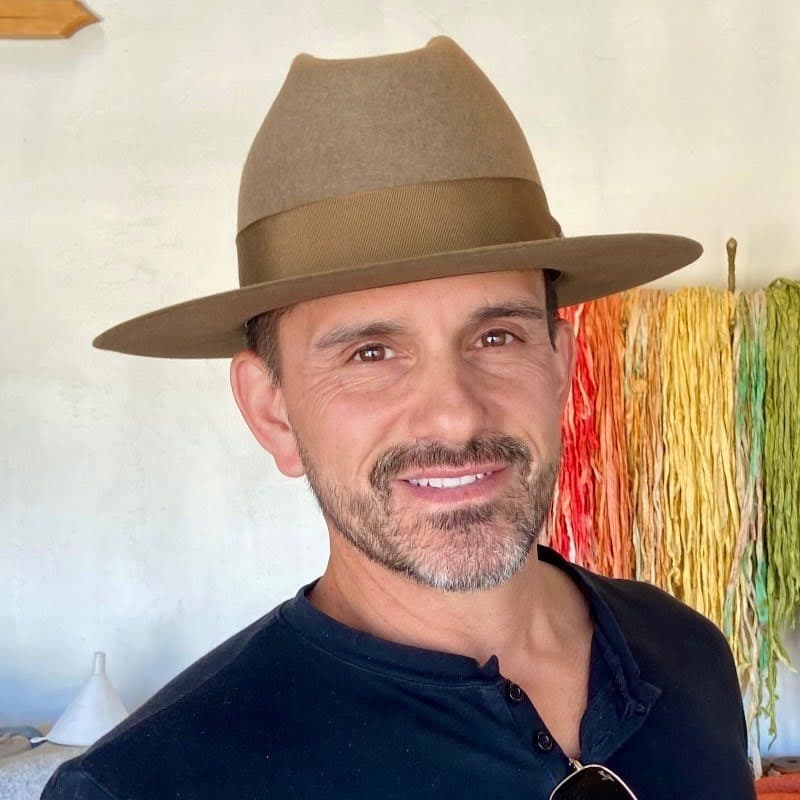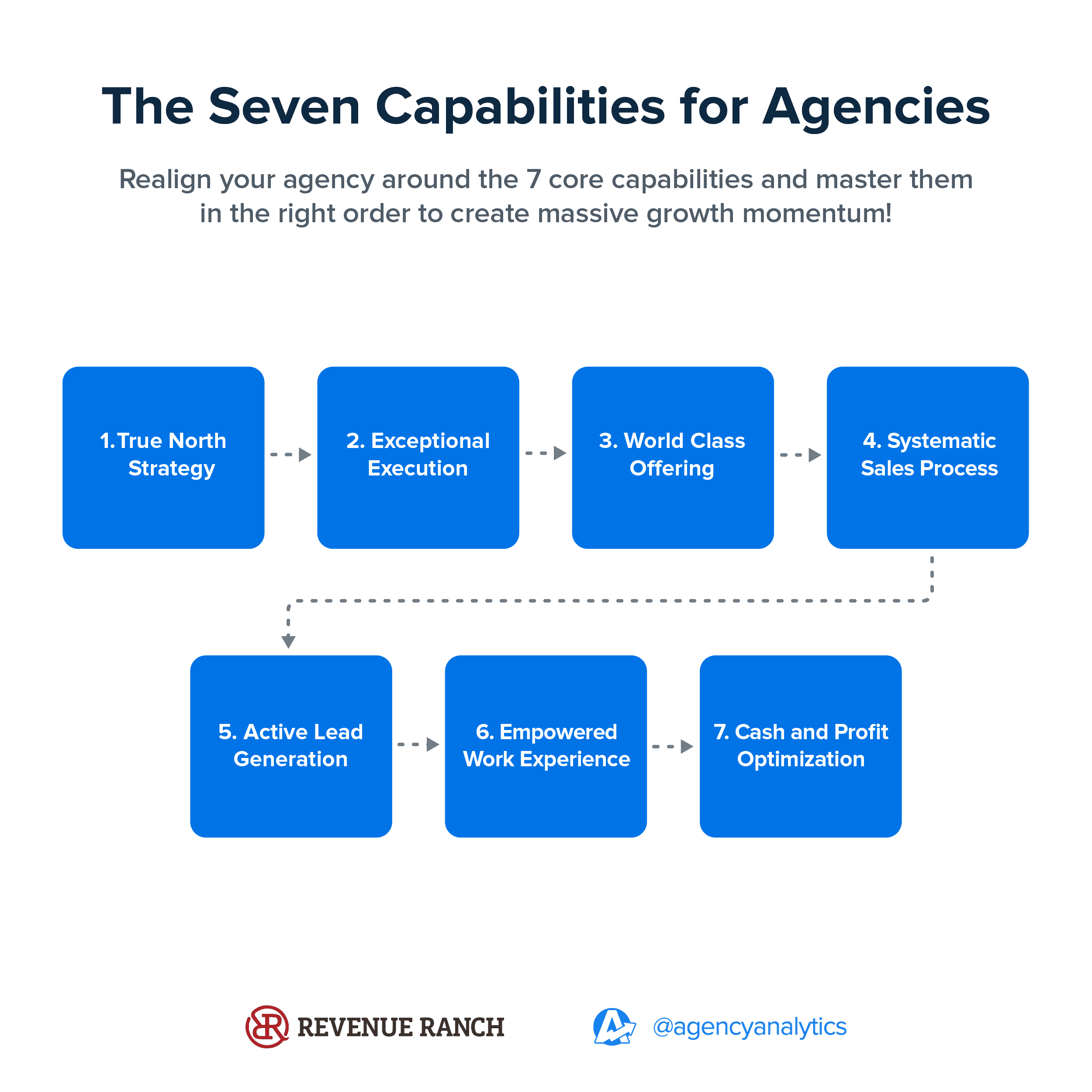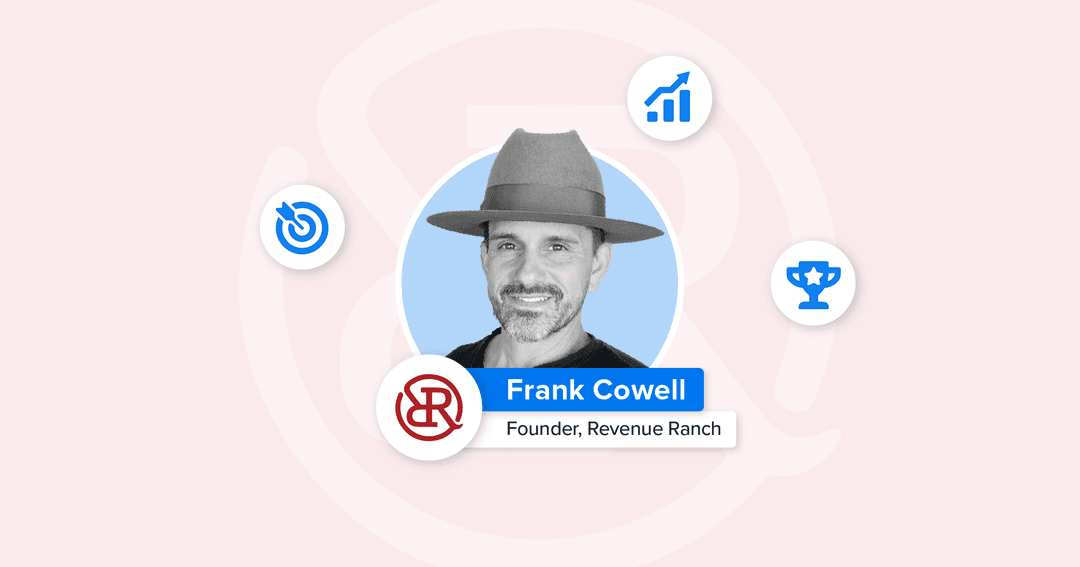Table of Contents
QUICK SUMMARY:
Frank Cowell’s Seven Capabilities Framework is a strategic blueprint for agency leaders looking to scale sustainably. Drawing from his own agency experience, Frank outlines seven core capabilities—ranging from strategy to sales to culture—that must be actively owned and optimized to drive growth. By focusing on one capability at a time, aligning with your “True North,” and assigning clear ownership, agencies can create momentum, reduce chaos, and scale intentionally.
If you're an agency leader gearing up to scale the business mountain, count yourself lucky you’ve got Frank Cowell as your sherpa.
Frank isn't just any guide; he's been climbing Mount Agency for more than two decades. As the Chief Revenue Boss over at Revenue Ranch, he's seen it all—the slips, the falls, and the breathtaking views from the top. With years of experience as an agency leader, consultant, and mentor, he's figured out exactly what it takes to make it to the summit.
That's where his Seven Capabilities Framework comes into play. In the marketing agency business—where the terrain is treacherous, and the path isn’t always clear—this framework is like having a backpack, a map, an oxygen tank, and a safety net rolled into one.
Frank crafted his framework with agency leaders in mind—folks like you ready to take their business from base camp to planting a flag at the peak.
However, before you admire the view, you must understand how to apply these Seven Capabilities to grow your agency and streamline your operations. With Frank leading the way, consider this article your invitation to strap on your boots, tighten your harness, and start the ascent.
Let's get climbing.
An Agency Leader Turned Expert Guide
Before we scale that mountain, let's talk about the guy holding the map. Throughout his journey, Frank Cowell has learned the hard way which paths lead to dead ends and which lead to breathtaking vistas.
Frank founded his first agency, Elevator, in early 2004. His primary focus was website development and internet marketing. He developed a successful content management system (CMS) from the ground up and grew Elevator into a seven-figure business.
Frank soon merged Elevator with another agency to form Digitopia, which he ran as CEO until 2022 before starting his consultancy service, Revenue Ranch. Throughout his agency career, he earned several recognitions, including being named 2012’s “American Marketer of the Year” by the San Diego Chapter of the American Marketing Association (AMA).

Still, Frank isn’t one to rest on his laurels. The desire to merge Elevator into Digitopia stemmed from realizing he was missing components that would take his agency to the next level—the genesis moment for the Seven Capabilities Framework.
I like to say that my best lessons come from the things that I did wrong and the ways in which I derailed myself. I'm very clear about that. That's just a real part of the journey that few are willing to share.
Frank Cowell, Founder, Revenue Ranch
When an agency scales, the leader will realize at one point or another that:
They are taking on too many capabilities and acting like the “hero” who swoops in to save the day when things descend into chaos.
They work more hours than they’d like and sacrifice their own well-being to keep the agency running.
They jump from tactic to tactic, trying to solve problems and eliminate blockers that require a larger solution.
They are losing momentum.
By his own admission, Frank was a sales rockstar at Digitopia. However, as the team grew, he realized Digitopia had someone else on the team who had the makings of a true sales leader.
“I realized that if I continued to be the rockstar, I was going to limit the company's growth,” he says.
So, as CEO, Frank elevated this team member to head of the sales process. This helped Frank focus on his greatest strength—giving the company direction—while letting the best-qualified person take over the sales process to spur growth.
I'll never forget what it felt like the moment we were landing clients I had never met. It was amazing to see that happen.
Frank Cowell, Founder, Revenue Ranch
How Does the Seven Capabilities Framework Provide Agencies Direction?
Frank is adamant that, as an agency leader, direction (your core strategic objective) matters more than the destination (your quantifiable targets) because the destination—the goalposts—will always change.
“I think the destination thing is a trap,” he says. “When you reach that destination, it's not going to feel like you've arrived.”
Frank emphasizes that there’s nothing wrong with setting targets. However, targets shouldn’t be long-term goals; they should be near-term objectives.
I'd much rather hear an agency owner say, ‘Our goal is to become the most effective at filling lead pipelines for dentists than anyone else in the world.’ I'd much rather hear that than someone saying, ‘We need to be doing 5 or 10 million a year in order for us to be successful.’ Because I promise that when you get there, there's going to be a reason why that's not good enough. Targets are important, but you should regularly realign to what you are becoming and the resulting impact that creates on your target audience.
Frank Cowell, Founder, Revenue Ranch
Part of setting direction for your agency involves recognizing that, as the CEO or leader, seven core competencies need to be filled for an agency to be successful:
True North Strategy: Knowing where you're headed and why.
Exceptional Execution: Turning plans into action with precision.
World-Class Offering: Providing services that stand out in a crowded market.
Systematic Sales Process: Converting those opportunities into victories.
Active Lead Generation: Filling your path with opportunities.
Empowered Work Experience: Equipping your team to be successful and productive.
Cash and Profit Optimization: Ensuring you have the financial resources you need.
Though each of the seven capabilities is associated with an internal agency role or department, Frank emphasizes that it’s not just about having people fill roles or job titles.
I want you to not think about the job titles of those functions. Instead, I want you to think about the purpose of those functions. Why do those exist in your business? What are they supposed to bring about? These are the capabilities you must bring to life.
Frank Cowell, Founder, Revenue Ranch
The framework is about fostering and actively growing these capabilities within your agency, making sure each one is as strong as it can be, whether you’re a team of one, three, or 300.
How the Seven Capabilities Help Agencies Scale
Let’s explore the Seven Capabilities in detail and outline how each plays a fundamental role in helping agencies achieve scalable growth.
1. True North Strategy (CEO)
The True North Strategy is where the climb begins. This capability is embodied by a CEO (or founder or owner) with visionary leadership and strategic clarity. The CEO sets the direction that will guide every step, decision, and action the agency takes.
The CEO’s job is to set the business strategy and make sure that nobody gets on the team and stays on the team unless they're a True North-compatible individual.
Frank Cowell, Founder, Revenue Ranch
This means crafting a business strategy that's universally understood and embraced across the organization. It ensures that every team member understands the agency’s core mission and moves in the same direction regardless of their role.
Read our full article on True North Strategy to learn how to action this step within your agency.
2. Exceptional Execution (COO)
The Chief Operating Officer orchestrates the day-to-day operations in a way that ensures every step taken is a step closer to the agency's overarching goals.
The COO ensures internal inefficiencies or misalignments don’t hamper the agency's journey and cause a slip. They implement systems and processes that streamline operations, foster collaboration, and enhance productivity. This capability is critical for scaling, as it builds the foundation for consistent, high-quality service delivery that clients will rely on.
To learn more about Exceptional Execution, read the full article.
3. World-Class Offering (Operations)
Helmed by Operations, a World-Class Offering differentiates an agency from its competitors—it’s the offering that clients rave about, and that gives them a reason to stay with your agency. It solidifies the agency’s reputation in the industry, attracts high-value clients, and fosters long-term partnerships based on trust and outstanding results.
This is where the agency’s commitment to excellence transforms from a strategic directive into high-quality services and client experiences that set it apart in the marketplace.
4. Systematic Sales Process (Sales)
A Systematic Sales Process means every prospect receives the same high level of attention and care, decisions are data-driven, and the sales cycle is optimized for efficiency. It’s about knowing your conversion rates, understanding the levers that move prospects closer to signing, and accurately forecasting sales.
With a Systematic Sales Process, prospects turn into opportunities, and opportunities turn into clients at a predictable and effective rate.
Frank Cowell, Founder, Revenue Ranch
This capability ensures that the hard work of marketing—generating active leads—translates into tangible growth for the agency.
5. Active Lead Generation (Marketing)
Active Lead Generation is about creating visibility and meaningful engagements that compel action. This involves understanding your audience, leveraging the right channels, and crafting a message that resonates. This capability requires creativity and analytical skills to optimize efforts based on performance data.
The whole purpose of marketing is to develop programs that result in active lead generation.
Frank Cowell, Founder, Revenue Ranch
It's a reminder that at its core, marketing is about bridging the gap between your agency's services and the needs of your potential clients.
6. Empowered Work Experience (Administration)
Led by the Administration function, an Empowered Work Experience means clear communication, pathways for growth, recognition of achievements, and a supportive culture that encourages innovation and collaboration.
The whole purpose here is to create an empowered work experience that allows our people to be the best they can be, personally and professionally.
Frank Cowell, Founder, Revenue Ranch
An Empowered Work Experience means a workplace where employees feel valued, supported, and motivated to contribute their best work. It means providing the tools, resources, and environment that enable staff to excel and feel a sense of ownership and pride.
7. Cash and Profit Optimization (Finance)
Finance's role extends beyond traditional bookkeeping; it encompasses financial forecasting, risk assessment, investment strategies, and revenue maximization.
By providing timely insights and detailed reporting, the Finance function enables the agency to anticipate market fluctuations and make informed decisions that safeguard the agency’s financial future.
Cash and Profit Optimization is the capstone of scaling efforts, ensuring growth is achieved, maintained, and enhanced.

How To Implement the Seven Capabilities Framework
Frank emphasizes the importance of assigning responsibility for each of the Seven Capabilities.
For a small agency, it could mean the owner/leader wears more than one hat, while a larger agency may have separate individuals, each tackling one capability.
You have to define the one name that is responsible for bringing that capability to the business. That's the entrepreneurial lens.
You may not have those job titles specifically defined, but someone is responsible for bringing that capability to life. So what you'll find in smaller businesses is the founder might have their name on four or five of those capabilities.
Frank Cowell, Founder, Revenue Ranch
Implementing the Seven Capabilities Framework into your agency's growth strategy boils down to a few key actions:
Tackle Capabilities One at a Time
You won’t get to the summit in one go. Focus on solving one blocker at a time before moving on to the next to create what Frank deems the most crucial aspect of scaling and growth: momentum.
Trying to upgrade everything at once will scatter your resources and dilute the effectiveness of your efforts.
The key thing is you're not trying to boil the ocean. You're not trying to solve every blocker in every capability area. You have to figure out your number one blocker to growth right now, and then disproportionately deploy time, money, and resources against it.
Frank Cowell, Founder, Revenue Ranch
Align Efforts With Goals
Make sure every effort in developing a capability is directly tied to your agency’s overarching True North strategy. As an agency leader, you want to keep your team focused and motivated and ensure everyone is pulling in the same direction.
Create a capabilities structure that includes a quarterly plan and weekly momentum accountability meetings. This is about self-accountability—not micro-management—and consistency.
Match Hires to Your Agency’s Direction
When bringing new people on board, look beyond skills to find individuals who are better at a capability than you are and align with your agency’s True North. The right hires will accelerate your progress in developing each capability, while the wrong ones will slow you down.
You want to find people that match the core values. You want to find people that are excited about the vision you have and the mission you've established in your True North.
Frank Cowell, Founder, Revenue Ranch
Cycle Through Continuously
View the application of the Seven Capabilities as an ongoing process rather than a checklist. Regularly review and adjust each capability to ensure your agency remains agile and on track for sustainable growth.
Find out the one that's holding you up and chip away at that one. And then as you grow an executive team, you can tackle more blockers.
Frank Cowell, Founder, Revenue Ranch
In essence, applying the Seven Capabilities Framework effectively means being strategic, focused, and consistent. It’s about making deliberate choices that drive your agency toward its long-term goals, one step at a time.
Create Momentum as You Scale the Agency Summit
Applying the Seven Capabilities Framework will profoundly impact an agency's growth trajectory and leadership development. It equips leaders with the tools to address the challenges of scaling and create momentum.
Leaders foster a culture of excellence and continuous improvement by focusing on one capability at a time, aligning team efforts with strategic goals, and ensuring that hires resonate with the agency's True North.
Like the best of sherpas, Frank encourages agency leaders to reflect on their current practices:
Are you scaling your agency in alignment with a clear strategic direction?
Do your daily operations apply the seven critical capabilities your agency needs to thrive?
Is there overlap or misalignment between capabilities, job functions, and titles?
More importantly, for leaders who feel like they’re running out of breath, are taking on too much, and want to reclaim time to focus on direction while ensuring the agency scales effectively, Frank asks:
What do you want out of this business? How is this business supposed to serve you?
Frank Cowell, Founder, Revenue Ranch
Now is the time to consider how the Seven Capabilities Framework will guide your strategic decisions, streamline your operations, and take your agency to new heights.
Scaling an agency requires resilience, a strategic focus, and the perseverance to face the climb's inherent challenges. The path may be steep, and the conditions may change, but with the right framework in place, the summit is within reach.
Impress clients and save hours with custom, automated reporting.
Join 7,000+ agencies that create reports in minutes instead of hours using AgencyAnalytics. Get started for free. No credit card required.

Written by
Francois Marchand brings more than 20 years of experience in marketing, journalism, content production, and artificial intelligence (AI). His goal is to equip agency leaders with innovative strategies and actionable advice to succeed in digital marketing, SaaS, and ecommerce.
Read more posts by Francois MarchandSee how 7,000+ marketing agencies help clients win
Free 14-day trial. No credit card required.






